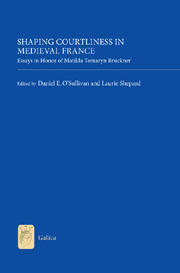Book contents
- Frontmatter
- Contents
- List of Illustrations
- Acknowledgements
- Introduction
- Matilda Tomaryn Bruckner: A Bibliography
- Part I Shaping Real and Fictive Courts
- A Perfume of Reality? Desublimating the Courtly
- Shaping the Case: the Olim and the Parlement de Paris under King Louis IX
- Charles d'Orléans and the Wars of the Roses: Yorkist and Tudor Implications of British Library MS Royal 16 F ii
- Part II Shaping Courtly Narrative
- Part III Shaping Women's Voices in Medieval France
- Part IV Shaping the Courtly Other
- Envoi
- List of Contributors
- Index
- Tabula Gratulatoria
- Already Published
Shaping the Case: the Olim and the Parlement de Paris under King Louis IX
from Part I - Shaping Real and Fictive Courts
Published online by Cambridge University Press: 05 May 2013
- Frontmatter
- Contents
- List of Illustrations
- Acknowledgements
- Introduction
- Matilda Tomaryn Bruckner: A Bibliography
- Part I Shaping Real and Fictive Courts
- A Perfume of Reality? Desublimating the Courtly
- Shaping the Case: the Olim and the Parlement de Paris under King Louis IX
- Charles d'Orléans and the Wars of the Roses: Yorkist and Tudor Implications of British Library MS Royal 16 F ii
- Part II Shaping Courtly Narrative
- Part III Shaping Women's Voices in Medieval France
- Part IV Shaping the Courtly Other
- Envoi
- List of Contributors
- Index
- Tabula Gratulatoria
- Already Published
Summary
Matilda Bruckner's Narrative Invention in Twelfth-Century Romance figures among several important recent studies that have shown the extent to which Old French verse romances, while normally culminating in an unmistakable “sense of an ending,” may also illustrate significant socio-cultural tensions and conflicts within the fictive universe without bringing them to any clear resolution. In its conclusion, Bruckner notes in passing that the absence of closure in many twelfth-century French romances is comparable to André Jolles's theoretical conceptualization of the Case, which is one of nine “elementary forms” he defines in his Einfache Formen (Fr. Formes simples). In essence, the Case as described by Jolles is an “open” form, antecedent to any achievement of a concluding verdict. As Bruckner puts it, “Cases pose questions about norms used for judgment and evaluation; they do not include final answers” … “[t]he lack of closure offered by the Case form allowed, on the one hand, a forum in which to express conflicting values generated by social and literary experimentation – without, on the other hand, requiring an explicit resolution of the conflicts involved.”
Taking my cue from this insight with regard to romance, I propose to consider here how Jolles's perception of the Case as a formal entity may apply as well to actual judicial cases as they had begun to be entertained in France only a few decades after the initial rise of Old French verse romance.
- Type
- Chapter
- Information
- Shaping Courtliness in Medieval FranceEssays in Honor of Matilda Tomaryn Bruckner, pp. 47 - 60Publisher: Boydell & BrewerPrint publication year: 2013



